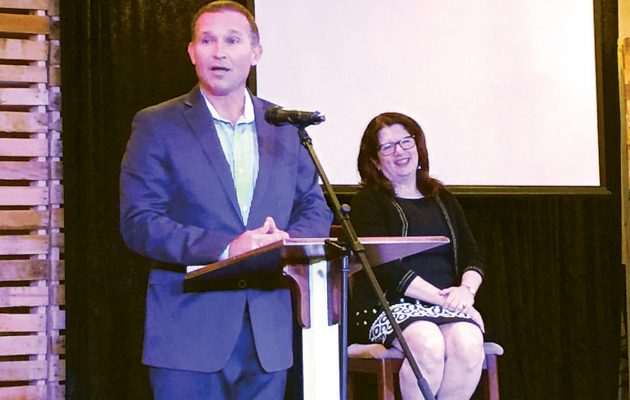Mayor peddles pension solution to San Marco residents

As far as Mayor Lenny Curry is concerned, the city has no other choice. It is imperative that residents pass a referendum giving the city a way to pay down its unfunded pension liabilities when they head to the polls Tuesday, Aug. 30.
During a San Marco Preservation Society Town Hall meeting July 28 at Southside Baptist Church, Curry beseeched San Marco residents to vote “Yes” on the ballot measure. He said approval of the extension of the half-penny sales tax, currently used to cover the costs of the Better Jacksonville Plan, is the only clear option to avoid a financial catastrophe similar to the municipal bankruptcy Detroit faced in 2013.
The new half-cent sales tax, which will begin in 2030 after the current tax ends, is a fairly painless way for taxpayers to combat the pension crisis, he said. It seamlessly continues a tax Jacksonville citizens are already accustomed to. Money raised from it would be earmarked solely to reduce the City’s unfunded pension obligations.
“If we don’t solve this now, this $2.7 billion unfunded liability is quickly approaching $300 million in costs (per year); if we don’t solve it now we are on the road to Detroit,” he said.
Curry said he plans to use the affirmative vote as leverage when he enters collective bargaining negotiations with the Police, Fire, Corrections and General Employee unions about closing three existing plans to new hires. Curry wants to replace the older more lucrative pensions with market-based retirement plans such as 401(k) accounts.
“If we don’t get an agreement with them we don’t get the half penny,” he said. “That’s how we protect the taxpayers.”
Once adopted, and collective bargaining is completed, the city would file an implementing ordinance for City Council to approve the collective bargaining agreement, detailing how the discretionary sales surtax would be dedicated only to paying the unfunded obligations. Once this is in place, by state law it will be “iron-clad” and future politicians could not divert the half-penny sales tax money away from paying off the pension liability, he said.
Jacksonville currently owns 25 percent of the total unfunded pension liability of more than 400 cities and counties throughout the state – a total of $2.7 billion – paying more than $270 million from its operating budget this year for its three public pension funds. Support of the three pension funds currently takes up 27 percent of Jacksonville’s budget, Curry said, noting this is a dramatic increase from 2009 when pension costs took up only nine percent of the budget.
In response to the suggestion that a sales tax be installed now to cover the liability, Curry said that is a “bad idea” because it would not be considered by the Florida House, Senate or governor. “It’s not even worthy of debate because it would not get a hearing in the Florida House, and if it did, the governor would surely veto it,” Curry said.
He also nixed the idea of raising the millage rate saying it would be “massive,” and would hurt property owners and businesses. It could not legally be used to solely to cover the pension liability and the money could be diverted toward other projects by future city officials, offering no leverage in upcoming negotiations with the unions, he said.
When asked about a lawsuit that was filed July 27 by five Duval County voters to remove the half-cent sales tax initiative from the Aug. 30 ballot, Curry said he isn’t worried.
The five oppose the referendum, stating the ballot language is confusing and misleading. They also point to confusion in the length of time the pension tax would last, stating the ballot summary says it will end “30 years maximum,” leading voters to think it will end 30 years from now and not 44 years from now because the dedicated pension half-cent tax will start in 2030. The lawsuit also states the ballot measure is illegal because the City Council voted in May to put the matter on the ballot even though the state law allowing the referendum only took effect July 1.
“I believe the lawsuit is baseless. The language is clear,” Curry said. “We’ve spent a lot of time and energy with the City Council and the General Counsel, all smart, right, capable, confident people to make sure we got it right. I’m confident that we got it right. If you look at the history you will see some of these folks have a history of filing lawsuits. I’m going to just keep doing my thing and seek a ‘Yes’ vote.”
By Marcia Hodgson
Resident Community News






